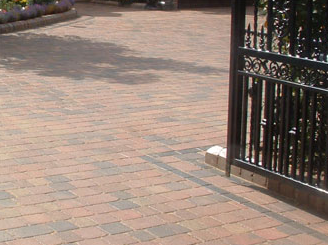1. Keep it weed-free
If the human population had to pick one plant that was more despised on grass, driveways and plant beds than the weed, it would struggle. Weeds are an unsightly nuisance that can compromise the aesthetics of your exterior and are a serious threat to national habitats, harming other plant species and causing serious soil disturbance.
For example, Australia has suffered a dramatic increase in weed invasions in recent years, because weeds here are spreading at a faster rate than they can be removed.
Fortunately, back in the UK, one method you can take to prevent the spread of weeds in your area is by treating all the gaps in the paving with weed-killer in the spring and summer months, when the plants typically grow at their fastest rate. Brushing newly emerging weeds can also prevent them from expanding. This is also a useful way to keep your block paving clean and should be performed at least twice a year. If left untreated, however, weeds can quickly spiral out of control and spread to other areas of your garden.
2. Lift sunken block paved driveways
When sand is released from the joints of the paving, your driveway may gradually sink, which may raise alarm bells and compel you to believe that your home is experiencing subsidence. However, fear not, because in many cases this problem is caused by excessive rainfall, which can gradually erode the sand in the joints, particularly if the paving is old and some cracks are present.
For example, it is probable that there was an increase in block paved driveway erosion in the first few months of 2014 owing to the UK’s exceptional wet winter, which was the wettest winter in almost 250 years of records.
When gaps are present in your block paving, freeze-thaw weathering may also occur, particularly during winter periods when night time temperatures fall well below freezing point but daytime temperatures rise above freezing. Professional driveway repair companies can easily raise the driveway again by adding new sand, compacting it, realigning the block paving before sanding it again.
3. Spot the warning signs earlier on
The earlier on your identify imperfections in your block paving, the easier it will be to rectify the problem. Financially, it is also more cost-effective for a homeowner to pay for a shorter repair job than a much longer, more complex repair. The main warning sign is when the paving becomes uneven and appears to have a lump or bump, which signifies the beginning of paving failure.
This process will often occur earlier with paving that has frequent contact (i.e. used by a car every day or has recently been flooded).
Remember, leave the complicated work to the professionals
If you think your block paved driveway will need to be repaired or completely replaced, it is a much safer option to consult a professional driveway repair company that will have the resources and the skills to understand exactly what will need to be done and when.
Neil Hodges is the Director of Block Paving Maintenance which has a team with over 25 years’ experience in the block paving industry and specialises in the cleaning, sealing and repairing of block paving driveways
